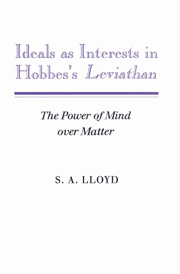Book contents
- Frontmatter
- Contents
- Acknowledgments
- A note on references
- Introduction
- 1 The standard philosophical interpretation
- 2 Hobbes's compositive reconstruction, phase one: identification of the principle of political obligation
- 3 Compositive reconstruction, phase two: religion and the redescription of transcendent interests
- 4 Hobbes's mechanism for the reproduction of social stability
- 5 Hobbes's resolutive analysis, phase two: part 4 of Leviathan
- 6 Theory in practice: Leviathan and Behemoth
- 7 Hobbes's resolutive analysis, phase one: design and detail
- 8 The treatment of transcendent interests
- 9 Hobbes's absolutism
- Notes
- Index
5 - Hobbes's resolutive analysis, phase two: part 4 of Leviathan
Published online by Cambridge University Press: 08 January 2010
- Frontmatter
- Contents
- Acknowledgments
- A note on references
- Introduction
- 1 The standard philosophical interpretation
- 2 Hobbes's compositive reconstruction, phase one: identification of the principle of political obligation
- 3 Compositive reconstruction, phase two: religion and the redescription of transcendent interests
- 4 Hobbes's mechanism for the reproduction of social stability
- 5 Hobbes's resolutive analysis, phase two: part 4 of Leviathan
- 6 Theory in practice: Leviathan and Behemoth
- 7 Hobbes's resolutive analysis, phase one: design and detail
- 8 The treatment of transcendent interests
- 9 Hobbes's absolutism
- Notes
- Index
Summary
If it be lawfull then for subjects to resist the King when he commands anything that is against the Scripture, that is contrary to the commands of God, and to be judge of the meaning of Scripture, it is impossible that … the peace of any Christian kingdom can be long secure. It is this doctrine that divides a kingdom within itself …
–Hobbes (B 63–4)We saw in Chapter 2 that the two most important implications of Hobbes's principle of political obligation were that sovereignty must not be divided and that it must not be limited. We saw in Chapter 3 that Hobbes was particularly concerned about one special form of division or limitation: the division of the rights of sovereignty between civil and religious authorities, and the limitation of civil authority by religious authority (either individual, as in the case of private conscience and private interpretation of Scripture, or collective, as in the case of authority exercised by churches conceived as independent of the state). Indeed, as I shall argue, Hobbes took the primary source of social disorder to be divisions of or limitations on civil authority of precisely this sort. It was crucial for Hobbes to persuade his readers that civil sovereignty included supreme religious authority, for “if that were not, but kings should command one thing upon pain of death, and priests another upon pain of damnation, it would be impossible that peace and religion should stand together” (EL 2.7.10, emphasis added).
- Type
- Chapter
- Information
- Ideals as Interests in Hobbes's LeviathanThe Power of Mind over Matter, pp. 167 - 188Publisher: Cambridge University PressPrint publication year: 1992



